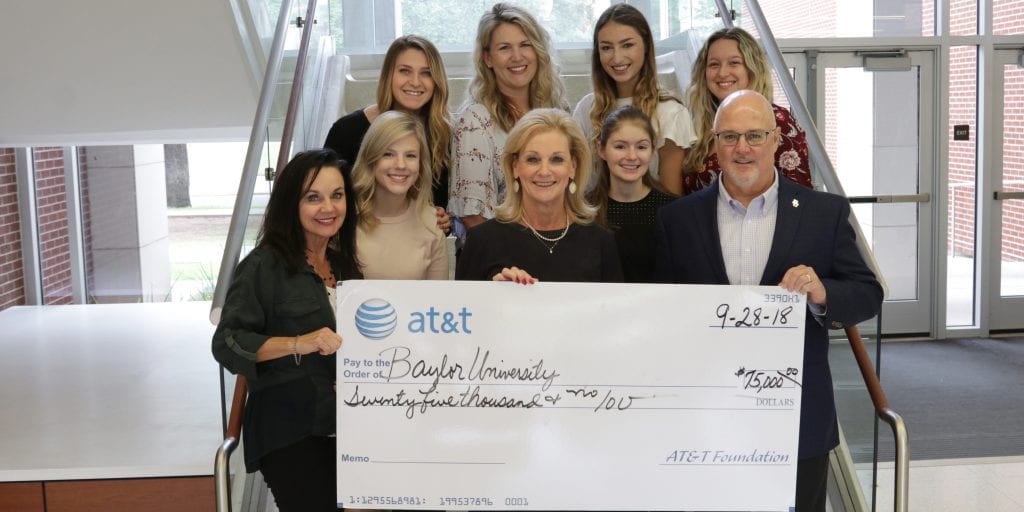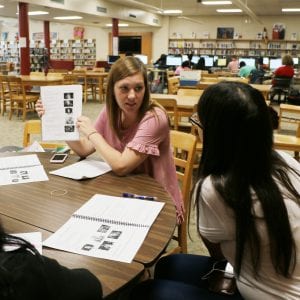
Pictured at the presentation of the grant award are student mentors with AT&T Foundation and Baylor representatives. Front L-R: Dr. Tamara Hodges, Becca Waits, Deborah Keel of the AT&T Foundation, Stephanie Fritz, Chris Krause of Baylor Development. Back L-R: Kelsey McCarty, Brenda Davis, Ally Yturralde, Felicity Frost
Baylor School of Education’s EnAbled for College project recently received a $75,000 renewal grant from the AT&T Foundation. The mentoring program increases marginalized high school students’ likeliness of choosing higher education by covering topics ranging from completing a Free Application for Federal Student Aid (FAFSA) to how to talk to a professor.
The program began with graduate students from the Department of Educational Psychology mentoring 52 disabled, at-risk or low socioeconomic status high school students through the process of reaching higher education. Since 2014, the program has served more than 150 students in McLennan County in Central Texas. Of those students, 71 percent were from low socioeconomic homes, 48 percent had a disability, and 74 percent were first generation students. With the help of the EnAbled program, 97 percent of the participants were accepted into college.
“It’s about the relationships built between the mentors and students,” said Dr. Tamara Hodges, senior lecturer in the Department of Educational Psychology, who co-directs the program with Interim Dean Dr. Terrill Saxon. “Disabled and at-risk students have less of a chance to move on to college or technical school, but by meeting them where they are and guiding them, we change the statistics, even on a small scale.”

Graduate student Jacy Latta is in her second year as a mentor for the EnAbled program, helping at-risk high school students attain higher education. (Photo: Cameron Boconegra)
Kelsey McCarty, a graduate student studying School Psychology, became a mentor in the program for her graduate assistantship because of her previous experience working with transition programs for disabled students. She was surprised by the amount of trust her mentees invested each time she visited. They were always willing to open up about their personal lives, academic struggles, and fears of their future, she said.
“Its so important for students to have a person who believes in them,” McCarty said. “Sometimes they don’t have anyone who cares, and that makes it so much harder for them to set and attain goals like getting a higher education.”
The AT&T’ Foundation’s renewal grant will fund the program through another year of mentoring.
“Another year means 60 more futures being changed,” Hodges said. “It means our mentors become more experienced individuals just by seeing the impact they make with students who are already full of recognized potential. They just need to learn their future is their choice.”
—by Cameron Bocanegra
For more news from Baylor School of Education, visit the Instant Impact home page.
For media inquiries, please contact Meg_Cullar@baylor.edu / (254) 710-6435.
ABOUT BAYLOR SCHOOL OF EDUCATION
Founded in 1919, Baylor School of Education ranks among the nation’s top 20 education schools located at private universities. The School’s research portfolio complements its long-standing commitment to excellence in teaching and student mentoring. Baylor’s undergraduate program in teacher education has earned national distinction for innovative partnerships with local schools that provide future teachers deep clinical preparation, while graduate programs culminating in both the Ed.D. and Ph.D. prepare outstanding leaders, teachers and clinicians through an intentional blend of theory and practice.
ABOUT BAYLOR UNIVERSITY
Baylor University is a private Christian University and a nationally ranked research institution. The University provides a vibrant campus community for more than 16,000 students by blending interdisciplinary research with an international reputation for educational excellence and a faculty commitment to teaching and scholarship. Chartered in 1845 by the Republic of Texas through the efforts of Baptist pioneers, Baylor is the oldest continually operating University in Texas. Located in Waco, Baylor welcomes students from all 50 states and more than 80 countries to study a broad range of degrees among its 12 nationally recognized academic divisions.
